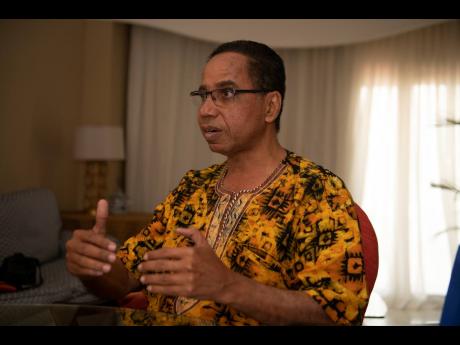Speak with one voice on Venezuela - Barbados ambassador to CARICOM calls for regional unity on crisis-ridden South American country
Barbados ambassador to CARICOM calls for regional unity on crisis-ridden South African country
In a subtle criticism of three CARICOM member states for their action in relation to the ongoing Venezuelan political crisis, Vincentian-born political activist, Ambassador David Comissiong, said that the region should be in one accord with regard to the South American country.
Comissiong, who is Barbados’ ambassador to CARICOM, said that despite the move which saw the three countries siding with the Lima Group – whose actions he views as ‘hostile’ towards Venezuela – the region should adopt and hold firm to a common position, preserving the peace in the Caribbean. That position, he stressed, should be anchored on the fundamental principles of international law of non-interference and respect for sovereignty, as well as on the Revised Treaty of Chaguaramas which established CARICOM.
“It is very important that we speak with one voice. The reason CARICOM was able to have such a positive influence on the Venezuela issue over the course of 2019 was precisely because, even though there were different views on how the issue was approached, we were able to come to a consensus,” the ambassador explained to The Sunday Gleaner.
The now 15-member Lima group is a multilateral body established following the Lima, Peru, Declaration on August 8, 2017. It was an assembly of 12 Spanish-and-Portuguese-speaking countries that met in the Peruvian capital as part of what they described as finding a solution to the political crisis in Venezuela.
Now three of CARICOM’s 14 members have joined the group, whose raison d’être, inter alia, demands the release of political prisoners; the end of human rights violations and calls for free elections in Venezuela. It is said to offer humanitarian aid “while criticising the breakdown of democratic order in Venezuela” under the socialist regime of President Nicolás Maduro and his predecessors.
STRENGTH IN UNITY
“It’s unfortunate that Guyana, St Lucia, and Haiti – three CARICOM states – have most recently joined with the Lima group that is pushing a very hostile position regarding relations with Venezuela. I say unfortunate because, in Western Hemispheric bodies, our only group should be CARICOM. Our strength really comes from our unity,” Comissiong stressed, adding that the region is too strong and important to be fragmented on fundamental issues.
“When we go to the Organization of American States (OAS), we control 14 out of 35 votes. That gives us strength, importance, and influence. So, I regret anything that denudes that strength and that influence. And I must emphasise that this is not a Barbados opinion, this is my opinion, really wanting to preserve the strength and influence of the body.”
Juan Guaidó, who has declared himself as Venezuela’s rightful interim leader, was not on the ballot of the disputed 2018 elections. Since emerging as a strong political voice, he has travelled to several countries seeking support to govern the country.
“Jamaica, for example, refused to recognise the Maduro administration. However, when Guaidó declared he was the president, Jamaica was not prepared to sanction that, because it understood the dangers of what Guaidó had done, because this could easily lead to a shooting war in Venezuela. So, the bloc was able then to consolidate a consensus around not everybody recognising the Maduro government, but we were not recognising Guaidó as the legitimate president and we were not in favour of any outside intervention in the country,” Comissiong explained.
The ambassador said that the region had convened an emergency sitting immediately after Guaidó declared himself president, which allowed the grouping to advance a troika of prime ministers to meet with important bodies of regional and international influence. Prime ministers Mia Mottley (Barbados), Dr Keith Rowley (Trinidad and Tobago), and Dr Timothy Harris (St Kitts and Nevis) represented CARICOM in meetings with the European Union, the United Nation Secretary General and the government of Mexico on the matter.
“We must remain a zone of peace,” Comissiong stressed.
Venezuela has been on the verge a political crisis since January 2019, with the world divided on support for both Maduro and Guaidó. Just minutes after Maduro took the oath as president last year, the OAS approved a resolution in a special session of its Permanent Council, which declared Maduro’s presidency illegitimate, urging new elections. The matter remains politically fluid.



